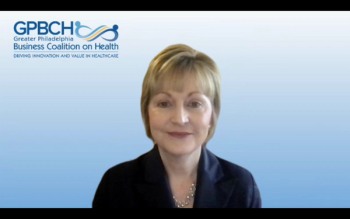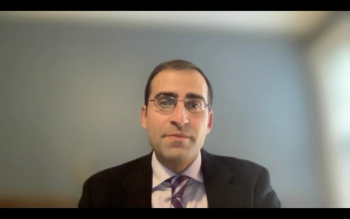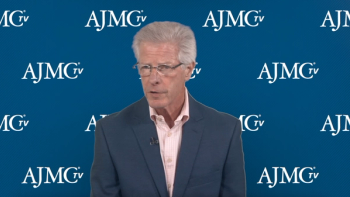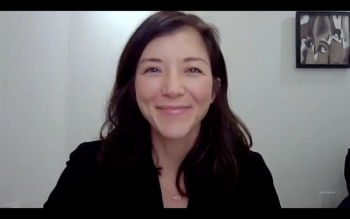
Sunil Verma, MD, senior vice president and global head of oncology, medical, at AstraZeneca, discusses the addition of durvalumab to a chemotherapy regimen of gemcitabine and cisplatin for biliary duct cancer.

Sunil Verma, MD, senior vice president and global head of oncology, medical, at AstraZeneca, discusses the addition of durvalumab to a chemotherapy regimen of gemcitabine and cisplatin for biliary duct cancer.

Julie M. Reed, the new executive director of the Biosimilars Forum, offers her opinion on how interchangeability will impact US biosimilar uptake now that the FDA has given the designation to 2 biosimilars.

Jill Hutt, vice president of member services at the Greater Philadelphia Business Coalition on Health (GPBCH), describes how the organization first became involved with the National Diabetes Prevention Program.

David Ramsey, MD, PhD, MPH, outlines why patients with diabetes should undergo regular eye examinations.

Stephen Schleicher, MD, MBA, chief medical officer of Tennessee Oncology, discusses the practice's plans to continue providing quality oncology care to its patients after the end of the Oncology Care Model (OCM).

Ted Mikuls, MD, MSPH, Stokes-Shackleford professor of rheumatology, vice chair for research, internal medicine at the University of Nebraska, discusses interventions and treatments that could prevent lower extremity amputation for people with gout.

Ron Do, PhD, associate professor of the Charles Bronfman Institute for Personalized Medicine at the Icahn School of Medicine at Mount Sinai, and Iain Forrest, MD-PhD candidate in Dr Do’s lab, explain the importance of their recent study measuring population-based penetrance of pathogenic and loss-of-function clinical variants.

Colette Romero, an advocate for eosinophilic esophagitis (EoE) awareness, discusses the steps her family went through to find a therapy plan that worked for her son.

Robert Sidbury, MD, MPH, chief of the Division of Dermatology at Seattle Children's Hospital, discusses risk factors involved in the pathogenesis of atopic dermatitis and several diagnostic methods.

James Auran, MD, a professor of ophthalmology at Columbia University Irving Medical Center and president of the American Society of Ophthalmic Trauma, lists potential solutions to bolster ophthalmic trauma care in the United States.

Dennis P. Scanlon, PhD, professor of health policy and administration at Pennsylvania State University and editor-in-chief of The American Journal of Accountable Care, discusses his 2021 end-of-year letter calling on health system leaders to learn and innovate in real time.

Robert Gabbay, MD, PhD, of the American Diabetes Association, explains why a section on chronic kidney disease management was added to the ADA's 2022 standard of care guidelines.

William Schaffner, MD, medical director at the National Foundation for Infectious Diseases (NFID), and Patsy Stinchfield, RN, MS, CPNP, president-elect of NFID, explain how the COVID-19 pandemic has had an impact on the seasonality of respiratory syncytial virus (RSV).

Kenneth Cohen, MD, FACP, executive director of clinical research at UnitedHealth Group Research and Development and senior national medical director at OptumCare, discusses areas where low-value care is more prevalent and the shift to high-value care.

On this episode of Managed Care Cast, Jill Hutt, vice president of member services at the Greater Philadelphia Business Coalition on Health, explains the Coalition’s efforts to reduce diabetes rates through the Diabetes Prevention Program (DPP).

Geoffrey Boyce, CEO of Array Behavioral Care, explains how behavioral health care differs between in-person and telehealth care.

Natalie Dickson, MD, president and chief strategy officer of Tennessee Oncology, discusses challenges for Tennessee Oncology and community oncology in general.

Robert A. Gabbay, MD, PhD, chief scientific and medical officer at the American Diabetes Association, shares his thoughts on long COVID-19 among those with type 2 diabetes and the rise of new-onset cases of type 1 diabetes throughout the pandemic.

Ted Mikuls, MD, MSPH, Stokes-Shackleford professor of rheumatology, vice chair for research, internal medicine at the University of Nebraska, explains how lower extremity amputation among US veterans with gout was independent of body mass index (BMI) and other risk factors.

Megan Olsen, MPH, principal at Avalere, explains how payers are attempting to get around cost concerns associated with expensive cell and gene therapies.

On this episode of Managed Care Cast, Amy Moy, the chief external affairs officer at Essential Access Health, outlines measures needed to address the sexually transmitted infection (STI) epidemic in the United States.

Anne Barmettler, MD, an associate professor of ophthalmology, visual sciences, and plastic surgery at Montefiore Medical Center, outlines adverse events patients taking teprotumumab for thyroid eye disease may experience.

Sunil Verma, MD, senior vice president and global head of oncology, medical at AstraZeneca, explains the background and results of the TOPAZ-1 study.

Sunil Verma, MD, senior vice president and global head of oncology, medical at AstraZeneca, summarizes the benefits and safety findings discovered in the HIMALAYA study.

Megan Olsen, MPH, principal at Avalere, explores the challenges that arise for Medicaid plans when providers choose to prescribe a cell or gene therapy.

Kathy Oubre, MS, chief operating officer of Pontchartrain Cancer Center, talks about how biosimilars have been able to help patients avoid financial toxicity related to oncology care costs.

Robert Gabbay, MD, PhD, of the American Diabetes Association (ADA), discusses the development process for the section of ADA guidelines that touches on chronic kidney disease (CKD) management in patients with diabetes.

Ted Mikuls, MD, MSPH, Stokes-Shackleford professor of rheumatology, vice chair for research, internal medicine at the University of Nebraska, discusses his study comparing rates of lower extremity amputations in US veterans with and without gout, using data from the national Veterans Health Administration.

Leon Herndon Jr, MD, a glaucoma specialist, ophthalmologist, and professor of ophthalmology at the Duke University Eye Center, explains how older patients with glaucoma may lose nerve fiber layer at a quicker rate than younger patients.

Robert A. Gabbay, MD, PhD, chief scientific and medical officer at the American Diabetes Association, discusses some of the challenges of treating pediatric patients with type 1 or type 2 diabetes.

259 Prospect Plains Rd, Bldg H
Cranbury, NJ 08512
© 2025 MJH Life Sciences®
All rights reserved.
